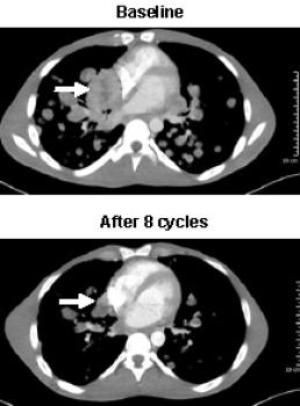Experimental Drug Shown To Shrink Tumors In Sarcoma Patients

Advanced alveolar soft part sarcoma (ASPS) is a rare tumor that progresses by feeding off blood's nutrient and oxygen supply.
In the largest clinical trial on ASPS yet, patients who were treated with an experimental anti-cancer drug showed vast improvement in tumor reduction, a new study shows.
The National Cancer Institute (NCI) funded the phase II clinical trial and the findings appeared in the Journal of Clinical Oncology on April 29.
"Our ability to bring patients with ASPS from across the country to the clinical facility on the NIH campus for treatment has made it possible to rapidly test this new drug in this rare tumor," said Shivaani Kummar, NCI principal investigator of the trial.
Researchers are saying the drug, called cediranib and made by AstraZeneca, originates from a class of proteins responsible for regulating the formation of blood vessels. In ASPS victims, the tumor uses newly forming blood vessels to gain nutrients and oxygen to promote its spread into the lungs, brain, and bones.
A 30 milligram oral dose of cediranib was administered once daily in 43 patients diagnosed with metastatic ASPS until the cancer spread or the patients experienced side effects.
Fifteen of the 43 patients showed more than 30 percent reduction in tumor size in the targeted regions, while the drug stabilized cancer in another 26 ASPS patients.
"It's unusual to see such high rates of tumor shrinkage in a cancer that traditionally has not responded to standard chemotherapy treatments used for sarcomas," said Kummar.
When researchers took a closer look and compared the tumor biopsies from before and one week after the treatment, they noticed a low expression of two genes (ANGP2 and FLT1) that regulate formation of blood vessels, meaning the cediranib cut the tumors' access to nutrients.
In other clinical trials, cediranib also tested effective against nonsmall cell lung cancer, kidney cancer, and colorectal cancer. Researchers are continuing a follow-up trial that compares cediranib and its success to another drug from the same class of proteins, called sunitinib, for metastatic ASPS patients.
ASPS is only one out of 50 different kinds of sarcoma and occurs in people between the ages 15 and 35. Up to 79 percent of ASPS patients develop the metastatic form of cancer and most conventional chemotherapies are resistant, according to Liddy Shriver Sarcoma Initiative.
Patients with tumors that could be surgically removed have a 40-month median survival rate, with a 20 percent five-year survival rate. Although surgery is the recommended treatment option, not all ASPS patients have that chance because the tumors have either progressed for the worst or have impeding conditions.



























